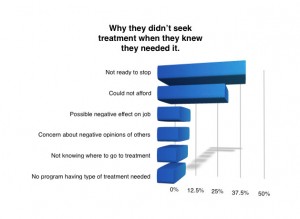 It’s natural to feel like we have a new shot at all our goals and dreams when one calendar year flips over to the next. So we resolve to lose weight, talk to our parents more, clean out those closets or get a better job.
It’s natural to feel like we have a new shot at all our goals and dreams when one calendar year flips over to the next. So we resolve to lose weight, talk to our parents more, clean out those closets or get a better job.
When you work in a life-or-death field like drug rehabilitation, it’s possible that the things you wish for at this time are a little different. They might reach a little deeper. Mean a little more.
Addiction is a problem that directly affects more than 20 million Americans. Indirectly, of course, it affects tens of millions more. Alcohol is more often the culprit than any other drugs – the World Health Organization estimates that more than two million people a year die as a result of their alcohol consumption. In some parts of the US, however, opiates like hydrocodone and heroin are competing with alcohol for first place in the contest to send people to rehab.
Be that as it may, here are our top five wishes for New Year’s 2015 and what we are working toward throughout the year.
1. For parents to realize that they are the most important figures in keeping kids off drugs.
We understand how hard it is to take up this subject with one’s kids. No one trains us for this job, and we may not even know the drugs our children are being offered. Very few kids listen with rapt attention when parents start talking about how the kids should not use drugs. But in our experience and according to the National Center on Addiction and Substance Abuse at Columbia University (CASA), the involvement of parents is critical. CASA has found that if a child can be convinced to avoid drugs or alcohol until they are 21, they are virtually certain never to have a problem with substance abuse.
Narconon has invested enormous effort into creating materials to help parents do this job. You can find many of these items on this page: http://www.narconon.org/drug-abuse/parent-center.html, most of which are available as free downloads.
2. For more people who need treatment for addiction to accept this truth.
How does one know that recreational use of drugs or alcohol has progressed to addiction? Some of the main ways include:
a) You’re experiencing damage to your relationships, work, education, health or finances and yet, you continue to use drugs or drink;
b) You’ve overdosed or landed in the ER due to drug use, perhaps more than once, yet you continue;
c) Your family or friends have expressed concern about your consumption;
d) You conceal how much of your preferred substance you have been using;
e) More and more of your life is devoted to acquiring and using this substance or substances. But according to statistics from the Substance Abuse and Mental Health Services Administra-tion, the vast majority of people who fail to get help for addiction simply don’t see the need.
Chart source: http://www.samhsa.gov/data/sites/default/files/NSDUHresultsPDFWHTML2013/Web/NSDUHresults2013.pdf
3. For those who do realize they need help to persevere through any barriers to getting that care.
In the following chart, you will see the reasons people have given for not getting the drug or alcohol rehab program they need. Some people are worried about their jobs, or don’t know where to go to get treatment or don’t have the funds. It’s not an easy task, we know. It’s a challenge for any family in both emotional and financial terms. Therefore, we wish for the fortitude of the family and the addicted person in achieving a sober end result. We know it can be done and we know it’s worth it.
4. For our world to shift its values to cherish sobriety over the cheap thrill of drink or drugs.
What would this mean? Our children would be drawn to sober role models. Our movies, television shows, music and music videos would not feature recreational drug use in a way that looks exciting or fun. Parents would be occupied with ensuring they are sober role models for their children. Certain college and university student bodies would focus much more on education, not on partying. Alcohol and drug advertising would not be permitted in any of our media. Every 21st birthday, wedding or New Year’s Eve party would not necessarily include the consumption of alcohol. I’m sure you can think of other ways a culture of sobriety could be manifested. The more the culture around a child values sobriety, the more that lesson will rub off on him.
5. And finally, we wish for you all these benefits that would result from a large decrease in drug or alcohol use.
- Less illness, fewer injuries
- Less workplace violence, greater productivity and profitability
- Less child and spousal abuse, more families staying together
- Less crime, more safety
- Fewer overdoses, fewer people injured by drug or alcohol abuse, lower health care and insurance costs
- Greater safety on the road, lower auto insurance costs and worry
- Less heartbreak for families and less desperation on the part of the addicted.
At we enter 2015, we will be working on bringing you these benefits with all possible energy. If you need tools to make things better in your area, contact us. We can help you. And if you or a loved one needs rehabilitation after addiction has stolen away his (or her) best qualities, call us today at 1-800-775-8750. We can help with that, too.

